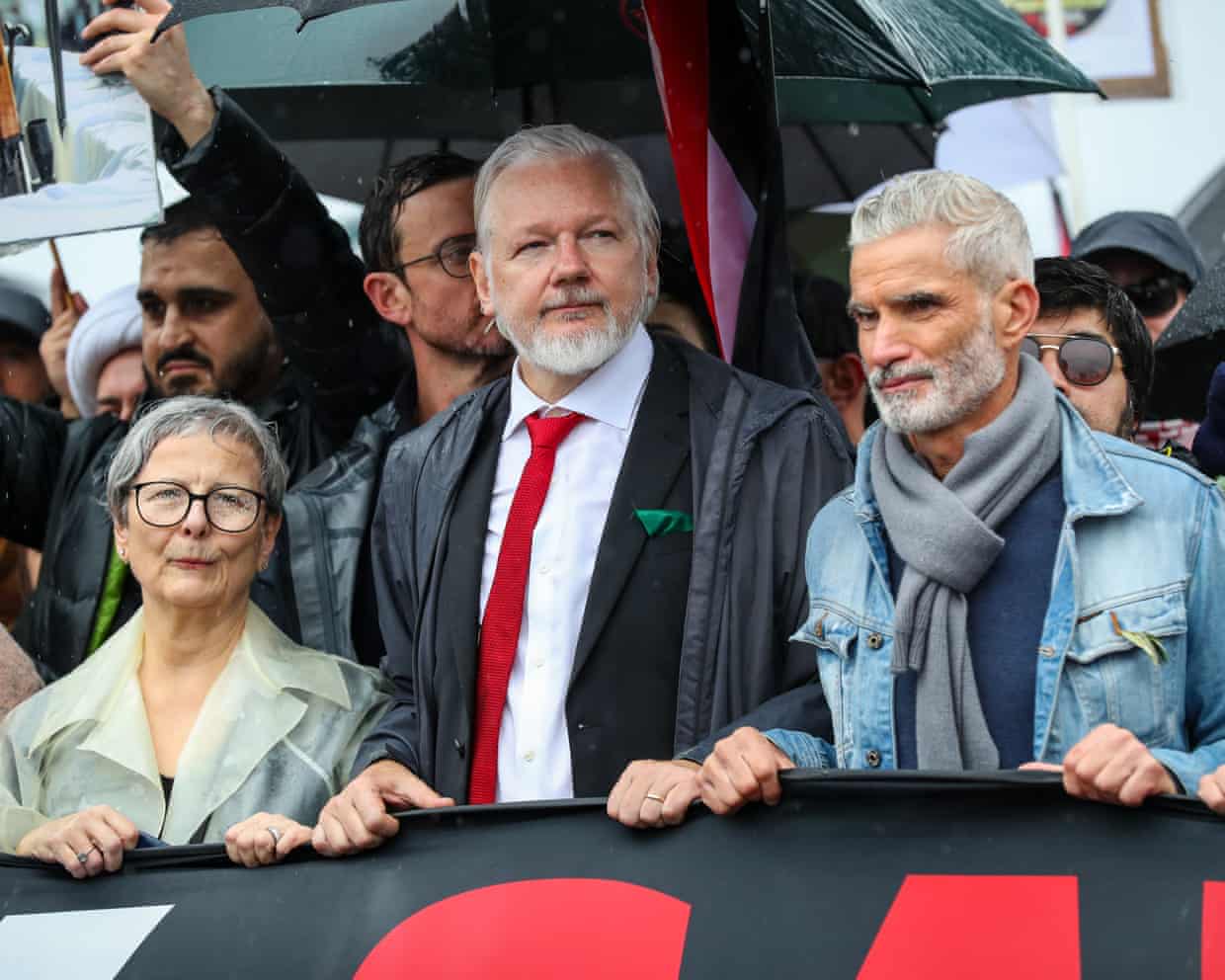Julian Assange participated in a large pro-Palestine march across the Sydney Harbour Bridge on March 17, 2024. The rally, which included prominent figures such as Bob Carr and Ed Husic, aimed to protest against Israel’s actions in Gaza and highlight the plight of children suffering from starvation in the region.
Protesters began gathering at Lang Park in the city centre under rainy conditions, with the bridge closed to traffic at 11:30 AM. As the march progressed, the crowd, estimated to be in the tens of thousands, made their way towards Bradfield Park. However, by 3 PM, the New South Wales Police issued a mass text message instructing participants to halt the march due to safety concerns.
The text stated: “In consultation with the organisers, the march needs to stop due to public safety and await further instructions.” A police helicopter monitored the situation as authorities directed protesters to turn around and return to the city. A subsequent message reiterated this request, emphasizing the need for a controlled return to ensure safety.
Prior to the police intervention, several notable speakers addressed the crowd. Indigenous actor Meyne Wyatt and former Socceroo Craig Foster, among others, rallied the marchers. Greens Senator Mehreen Faruqi delivered a passionate speech, criticizing New South Wales Premier Chris Minns for his stance on the protest. “Thank you for defying Chris Minns,” she said. “This is a man who wants you to stay home and be silent in the face of a genocide.”
Senator Faruqi contended that the issues surrounding the march were not logistical but rather efforts to suppress dissent and protect the Israeli government from accountability. Her remarks resonated with many in the crowd, who carried pots and pans to symbolize the hunger crisis in Gaza, alongside Palestinian flags and placards.
Although police initially rejected the organisers’ application to facilitate the march, citing concerns about crowd safety and potential traffic disruptions, the NSW Supreme Court ruled in favor of allowing the event to proceed. Protesters expressed their determination to voice their concerns despite the adverse weather conditions.
Among the demonstrators was a British man named Dan, who held a sign reading “Gay Jews 4 Gaza.” He articulated his belief that there is a pervasive form of Zionism within the Jewish community that does not represent all Jewish perspectives. “It’s important for people within the community to stand up and raise their voice against the state of Israel,” he stated.
Another participant, registered nurse and midwife Philomena McGoldrick, who has worked in Gaza, shared her sorrow over images of starving children. “Innocent babies have no colour, no religion, no language. It’s heartbreaking,” she said, expressing gratitude for the collective effort of those marching. “But it’s nice to meet people standing on the right side. The tide has changed.”
Assange, who has made few public appearances since returning to Australia after a lengthy extradition battle, was seen among the crowd alongside Carr. The former New South Wales premier and federal foreign affairs minister called for the Australian government to impose sanctions on Israeli Prime Minister Benjamin Netanyahu. Carr emphasized that such actions would convey Australia’s condemnation of what he described as the “deliberate starvation” of Gaza.
Husic, a federal Labor MP, joined the rally and marched alongside five state Labor MPs who defied the Premier’s directives. Together with 15 other NSW politicians, they had signed an open letter calling on the government to ensure a safe and orderly event.
Meanwhile, in Melbourne, pro-Palestinian protesters encountered obstacles as police blocked their planned solidarity march across King Street Bridge. Video footage circulated on social media showing police in riot gear preventing protesters from crossing. Victoria Police confirmed they would release a statement regarding the situation.
In Sydney, Transport for NSW advised the public to avoid non-essential travel around the central business district and northern parts of the city as the protest unfolded. The march highlighted ongoing tensions regarding the humanitarian crisis in Gaza and the international response to the conflict.
